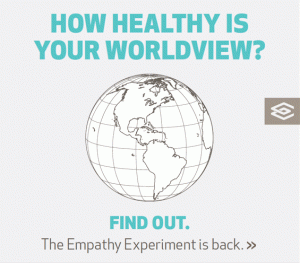Back for a second year, The Empathy Experiment hopes to once again reach out to students and allow them the to discover an experience outside of their normal comfort zone.

Building off of the learned experience last year, Capital University President Denvy Bowman is creating a similar experiment with students to discover whether empathy can be taught to the participants through their experiences.
“I don’t want to give too much away about the details of this year’s Empathy Experiment,” Bowman said, “especially during the application period. But I can tell you we will be accepting nine students into the program this year. The inaugural class had six members. I can also tell you we will explore a different social issue this year, and we necessarily will be relying on guidance from a different group of community partners whose expertise is relevant to the social issue we’ll explore.”
Last year 6 students experienced what it was like to be poor in America.
“The purpose of the Empathy Experiment is to immerse young individuals in different environments that are unfamiliar to them,” former Empathy Experiment participant Diana Crandall said.
“While the question prompted, ‘Can empathy be taught?’ the true experience was not the students walking around trying to ‘learn’ empathy – rather, we experienced different real-life scenarios that allowed us to look inside the lifestyles and circumstances of many different individuals.”
Last year the experiment took a look at the students of Capital and whether or not they would have been able to empathize with someone in a completely different situation than college students usually find themselves.
Crandall said that she did develop much of that empathy that the experiment was looking to dig up, especially in one occurrence which affected her deeply:
“The most troubling obstacle was being evicted from my dorm, no questions asked. The stability that many of us take for granted is far more influential than I realized. I have never been homeless – it took about one hour to realize how horrible it would be if I were.”
Bowman emphasized with the first experiment that this is not to create sympathy, but rather to breed true empathy within the student participants.
Sympathy is important as well but it can be developed without ever having to walk a mile in someone else’s shoes. The benefit of the experiment is that it provides participants with the metaphorical shoes as well as the perspective that is needed to grasp another person’s situation with clarity.
Bowman also stressed the human element involved, that this experiment is worked on with others who are experiencing similar things. The students will take upon a certain role through an organization that is meant to point out the struggles that people face in relation to the issues that the organization deals with.
“Students will be challenged,” Bowman said. “They’ll have the opportunity to work closely with me and to establish connections with the leaders of influential Central Ohio organizations we partner with; they’ll develop a more comprehensive understanding of the issue and the people affected by it.”
Although the date to sign up for the experiment has passed, there is still an opportunity for those who witness the experiment’s progress to learn from it, and from those who participate in it.
“I think that someone who is skeptical of the effect that this experiment can have would make a great candidate,” Crandall said.
“On the flip side, if you are an empathetic person , this experiment is definitely for you. If you are already empathetically inclined, I think you will see more results in the end. However, people who are cynical of this experiment will definitely like the challenge – and I think, will be pleasantly surprised with what they experience. Plus, who doesn’t want to hang out with Denvy Bowman?”
The purpose of this experiment, Bowman says, is to breed humility and empathy in students of varying backgrounds who have room to learn what it is to be empathetic to a person in a harsher situation than their own.
“But I hope they walk away with even more,” Bowman said, “a changed perspective; an increased ability or inclination to relate to others whose experiences are different from theirs; a sense of empowerment or obligation to act on behalf of others, to be ambassadors for social change. “

